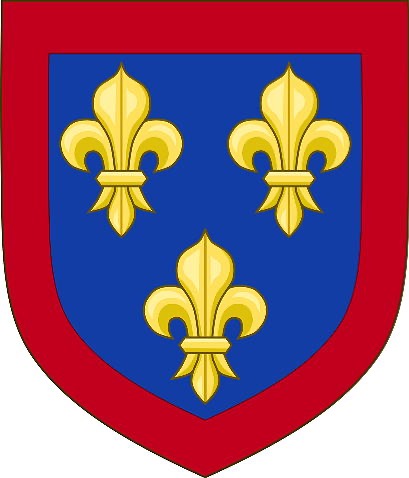Fulk II of Anjou

Coat of arms of Hercule (François) of Valois, Duke of Anjou
By Carlodangio - Own work, CC BY-SA 4.0,
https://commons.wikimedia.org/w/index.php?curid=61574700
"I'm a dabbler …"
Though my heritage identifies me as a direct descendant of the kings of France, Spain, England, Italy, and what would one day become Germany, I do not feel very much like royal material. This condition might speak back to my high school years when my guidance counselor declared me not college material, a welcomed designation at the time, for it freed me up from concern about getting good grades or paying for college. I considered the declaration a Get Out Of Jail Free card in my early real-life Monopoly playing. Likewise, I can't see myself concerning myself with all the relationships necessary to maintain a halfway decent duchy, let alone a full-blown kingdom. It doesn't surprise me that royalty fought each other so continually and aggressively, for each seemed to be playing extended games of Suicide Chess, an unimaginably complex undertaking sure only to leave every player paranoid.
One of my lesser forebears, a full-blown Duke of Anjou, Fulk II, The Good, was known for his skill at negotiating strategic marriages. Fulk II of Anjou's grandaughter ended up marrying Robert II of France, son of Hugh The Great, considered to be the first King of France and founder of the house that would bring together the duchies and rule France until the eighteenth century; indeed, up to and including today. Not bad for a relatively minor Duke. The House of Anjou would eventually insinuate itself into almost every corner of European and even Middle Eastern aristocracy. Fulk II of Anjou was near the start of a series of Duke of Anjou dynasties that would eventually encompass Hungary, Poland, Italy, France, England, and even Jerusalem, primarily due to strategic marriages. Fulk II of Anjou was an insidious force with which to be reckoned.
My particular thread of succession fell off the central trunk of this part of the old Fambly tree. Succeeding by marriage often meant a son inhereted lands that rarely ever managed to enrich the mother's birth family, however well-connected and helpful that mother proved to be to the inheriting family. Dynasties tended to follow paternal paths and near the end of the Dark Ages, when Fulk II of Anjou lived, the would-be French began dabbling in electing kings rather than choosing them strictly by lineage. There were many deviations from this ideal since electing dukes and such would often be unable to agree on a candidate. Alliances shifted, and even marriages were not necessarily considered sacred. A few more audacious Dukes weren't opposed to bigamy if it would better cement some coalition. The blood of even an illegitimate daughter was still thicker than water.
So, while I find discovering my genealogy interesting, I admit that I also find it fundamentally baffling. If I'm ever going to gain any kind of facility with the subject, I'll need to pursue a PhD in European history, and I'm confident that's not happening. I'll leave that scholarship to my progeny to contend with. I'll be the pioneer and leave the hard work of settling and building something more permanent to those perhaps better suited to that effort. I'm a dabbler, poking and prodding and giggling to myself when I stumble upon a reference to an obscure thirty-first great-grandfather named Fulk II of Anjou. Fulk you, two.
©2024 by David A. Schmaltz - all rights reserved


